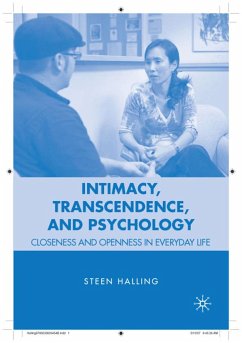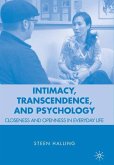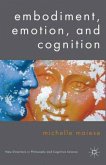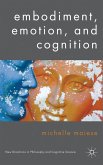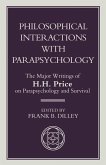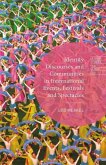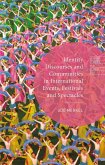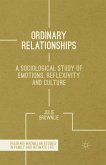This book addresses the richness and depth of our intimate relationships and especially those moments when we come to see ourselves and the other person in a new way. In such moments we realize that however much we are influenced by heredity and upbringing, we are also agents with the capacity for openness and transcendence.
"Given an opportunity - that is, a willing reader - this volume could change lives. The journey Halling outlines transcends helping self or others and involves true seeing. To "see" someone means to understand, to accept, and to value. But Halling applies the concept to the relationships of everyday life and points out that through seeing others one learns to appreciate diversity, recognize one's own humanity, and, hence, recognize the humanity in others. This volume is a must for those wishing to (or helping others to) develop a more inclusive worldview." - R. E. Osborne, Choice
"This is a beautifully written book. Carefully and compellingly charting a course through terrain fundamental to human life-intimacy, disillusionment, forgiveness-the book presents a rich, subtle, and integrated portrayal of individuals as relational beings. Combining astute and sensitive analysis of material from participants with readings from a wide range of sources, the book reveals a depth of understanding which results from Halling s years of engaging these topics. The book is a glowing testimony to the phenomenological approach advocated by the author." - Jonathan A. Smith, Professor of Psychology, Birkbeck College, University of London
"Halling studies phenomena that are usually ignored by mainstream psychology because they are impossible to measure and seeks the meaning of these experiences to begin to clarify them . . .No barrier is placed between the experience and the understanding by Halling, he even dares to suggest that the disturbed person is first of all human and has to be studied with respect and understood with sympathy. The secret of hismethodis revealed as he explains his phenomenological approach and how it can be used to understand interpersonal relationships and their vicissitudes in a superior way. Psychologyhas to deal with everyday phenomena as theyare lived - not abstracted or constructed by the researcher - and Halling has shownus how to do this." - Amedeo Giorgi, Professor of Psychology, Saybrook Graduate School
"Halling brings a wide array of itellectual wealth to this project. It must be said that Halling's book is a wonderful analysis of forgiveness and transcendence. Here, [the author] is at his best, and the text opens up all sorts of intersting new issues concerning openness as a way to live life. Overall this project has much to offer students of psychology, practicioners, and the layperson. Academics of all stripes too often forget that what we should be most concerned about is 'real' life - that is, how our theories apply to our own existence and the existence of those we love - and occasionally need to forgive. Lucky for us all, Halling is thoughtfully pointingus in the right direction." - Danielle Meijer, Journal of Phenomenological Psychology
"This is a beautifully written book. Carefully and compellingly charting a course through terrain fundamental to human life-intimacy, disillusionment, forgiveness-the book presents a rich, subtle, and integrated portrayal of individuals as relational beings. Combining astute and sensitive analysis of material from participants with readings from a wide range of sources, the book reveals a depth of understanding which results from Halling s years of engaging these topics. The book is a glowing testimony to the phenomenological approach advocated by the author." - Jonathan A. Smith, Professor of Psychology, Birkbeck College, University of London
"Halling studies phenomena that are usually ignored by mainstream psychology because they are impossible to measure and seeks the meaning of these experiences to begin to clarify them . . .No barrier is placed between the experience and the understanding by Halling, he even dares to suggest that the disturbed person is first of all human and has to be studied with respect and understood with sympathy. The secret of hismethodis revealed as he explains his phenomenological approach and how it can be used to understand interpersonal relationships and their vicissitudes in a superior way. Psychologyhas to deal with everyday phenomena as theyare lived - not abstracted or constructed by the researcher - and Halling has shownus how to do this." - Amedeo Giorgi, Professor of Psychology, Saybrook Graduate School
"Halling brings a wide array of itellectual wealth to this project. It must be said that Halling's book is a wonderful analysis of forgiveness and transcendence. Here, [the author] is at his best, and the text opens up all sorts of intersting new issues concerning openness as a way to live life. Overall this project has much to offer students of psychology, practicioners, and the layperson. Academics of all stripes too often forget that what we should be most concerned about is 'real' life - that is, how our theories apply to our own existence and the existence of those we love - and occasionally need to forgive. Lucky for us all, Halling is thoughtfully pointingus in the right direction." - Danielle Meijer, Journal of Phenomenological Psychology

